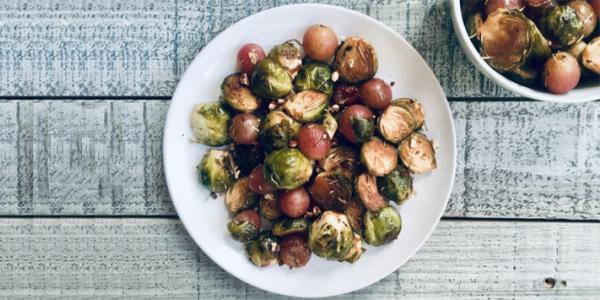
Try this nutritious recipe.
Yield: serves 4 as a side
Skip
Ingredients:
- 2 pounds Brussels sprouts, trimmed and cut in half through the core
- 2 cups organic red grapes, whole
- 1/4 cup balsamic vinegar
- 1 tablespoon pure maple syrup
- 1 tablespoon olive oil
- 2 cloves garlic, minced
- 2 teaspoons dried rosemary
- 1/4 teaspoon sea salt
- Pinch of ground black pepper
- 2 tablespoons pecans, chopped (optional)
Directions:
- Preheat oven to 375 degrees F. Prepare a baking sheet by lining it with aluminum foil or parchment paper and spraying it with non-stick cooking spray.
- In a large mixing bowl combine balsamic vinegar, olive oil, maple syrup, garlic, rosemary, salt and pepper. Stir until combined.
- Add Brussels sprouts and grapes to the bowl, and toss to coat.
- Evenly spread the Brussels sprouts, grapes and liquid mixture onto the prepared baking sheet.
- Bake for 45 minutes or until Brussels sprouts and grapes are soft and blistered, tossing half way through.
- Garnish with a sprinkle of chopped pecans if desired. This dish is best enjoyed warm and fresh. Enjoy!
Nutrition Tips:
- Brussels sprouts are part of the Brassica genus of plants, which includes arugula, broccoli, cabbage, cauliflower, collard greens, kale, radishes and turnips. Like all cruciferous vegetables, they are nutrient packed! Brussels sprouts are rich in bone-building vitamin K, electrolyte balancing potassium, immune boosting vitamin C, filling fiber, and functional folate.
- Brussels sprouts, like all cruciferous vegetables, are high in fiber. Just one cup of Brussels sprouts contains 4 grams. Fiber helps feed our good gut bacteria, supporting a healthy microbiota and digestive system. Studies have found that diets rich in cruciferous vegetables, including Brussels sprouts, have the ability to influence the growth and diversity of beneficial gut bacteria.
- According to The American Institute for Cancer Research, there is good evidence to suggest that diets rich in cruciferous vegetables lower risk for mouth, pharynx, larynx, lung and colorectal cancer.

